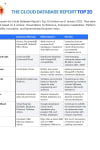Oracle, Teradata, and Revenge of the Legacy Database VendorsThese old dogs have learned some new tricksLong-established database providers—IBM, Oracle, SAP, Teradata, et al.—are often referred to as “legacy” vendors, a term used derisively to imply they are expensive, entrenched, siloed, and outdated. But these old database dogs are learning new tricks. It would be a mistake to think their best days are behind them. My view is that the so-called traditional database providers will be hard to displace because they have long-established customer relationships, they are proficient in hybrid cloud environments (because so many of their customers are still on premises), and they continue to innovate as they race to keep up with cloud-native startups. Not only that, but the potential pain, costs, and risks of migrating away from these installed database management systems are a strong incentive to IT teams to stay put. In many cases, those DBMSes represent years of investment, and changes are not to be taken lightly. Recent developments by Oracle and Teradata—which together have been around for more than 80 years—provide a few proof points that these elder citizens of the tech industry are not taking anything for granted. Oracle’s Next Growth EngineIn the past few months, Oracle has agreed to acquire Cerner for $28.3 billion, giving it a major foothold in the healthcare market; it has one-upped MongoDB in the area of cross-platform compatibility; and it has been certified by the Defense Department for top-secret use cases. The details:
Teradata Teams with AWS, Google Cloud, MicrosoftLike Oracle, Teradata traces its roots to the 1970s. It was once part of the former National Cash Register Co., founded in 1884. Talk about legacy! Teradata sometimes gets dinged for its large installed base of on-prem systems, but the company has been transitioning to the cloud through partnerships with AWS, Google Cloud, and Microsoft Azure. In its Q4 earnings, Teradata reported a 91% increase in public cloud annual recurring revenue for 2021, a signal of growing cloud adoption. Look at what Teradata has done in February alone:
For more on Teradata’s priorities and a partnership with AWS, see my podcast interview with SVP Ashish Yajnik. Maybe Legacy Isn’t Such a Bad WordOracle and Teradata are among the Cloud Database Report’s Top 20 vendors. You can download the full list below.
Make no mistake, Oracle, Teradata, and the other Boomer-generation database vendors face challenges, including the risk of obsolescence in a fast-paced market and customer worries about lock-in and licensing. But, as these recent examples show, they are growing and expanding—into new industries (in the case of Oracle) and through far-reaching cloud partnerships (in the case of Teradata). So, while “legacy” can connote unwanted baggage, it may also signal decades of hard-earned experience supporting the most demanding operational and analytical workloads in the world. The old dogs still have some bite. You’re a free subscriber to Cloud Database Report. For the full experience, become a paid subscriber. © 2022 John Foley Unsubscribe | ||||||||||||
ERP documents are collection from various sources. We don't create them. They are created and owned by mentioned respective authors.
Document Authors: No copyright infringement intended. If you want us to add / remove this content, please let us know by writing to goodreads @ onlyerp dot com
Oracle, Teradata, and Revenge of the Legacy Database Vendors
Oracle, Teradata, and Revenge of the Legacy Database Vendors

These old dogs have learned some new tricks
Parent Category: Articles
Good Reads
Hits: 302



